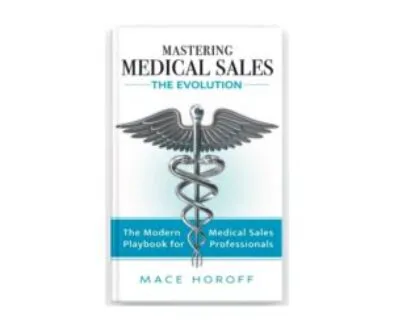The Insanity of Medical Sales Reps and Their Managers
 I’m brought in to work with under-performing medical sales teams. When I interview reps one-on-one and ask why they’re not growing their territories, they’re often quick to blame the company for not supporting their efforts or crediting their competition with having better products.
I’m brought in to work with under-performing medical sales teams. When I interview reps one-on-one and ask why they’re not growing their territories, they’re often quick to blame the company for not supporting their efforts or crediting their competition with having better products.
Flash forward to the sales training workshop when I get to see the sales team in action. That’s when the main reason for poor performance rears its ugly head. It’s obvious to everyone in the room who observes the top performers vs. everyone else. The top performers are having very different conversations with their customers.
Here’s the kicker—the average and low-performers—they know what they should be saying and doing. They’re just not doing it! The question is why.
It has been said that the biggest gap in the world lies between what people know and people do. The average salesperson knows that he is supposed to have a conversation that is customer-focused, yet the vast majority of the time, if you observe them, it’s product-focused. The reason is because the sales reps have not been trained to have the right conversation. Oh sure, they’ve been taught, but no one in the organization has determined whether or not they’re competent.
Imagine you were learning to fly an airplane. Most wannabe pilots begin their education by reading about flying. They’ll watch videos and maybe even play around with a computer flight simulator. At this point, does the flight instructor toss them the keys to the airplane and say, “Here. Take her for a ride. You understand how to fly a plane”? The answer is no. Why? Because the student pilot would kill himself. It’s one thing to know and understand how something is to be done—it’s another thing to have the skills to do it.
Student pilots get an average of 20 hours of individualized, intense flight training before they’re allowed to fly solo. The flight instructor doesn’t turn them loose to practice on their own until he’s sure they won’t hurt the airplane, themselves, or anyone else…
Yet managers turn sales reps loose in their territories without ever seeing them in action. These reps engage valuable customers, trying to sell a product where millions have been invested and no one has validated their abilities. It’s nuts.
Left to their own devices, the vast majority of sales people will continue to sell intuitively, crashing and burning in front of their customers. Yet, managers shrug their shoulders as if they haven’t a clue why their sales teams are underperforming. It’s because the sales reps haven’t been validated to make sure they “know how to fly.”
A few reps seek help on their own. They’ll invest in online training or hire a sales coach. But most won’t spend a dime of their own money. They’ll wait to see what the company provides and just keep on doing what they’re doing. Yet they’ll bitch and moan that they can’t get an appointment with a doctor or a key decision-maker. And they dread the manager’s phone call questioning their poor sales numbers.
Companies are often just as guilty. They leave everything to their training departments, blame the sales reps, and hope that things will improve. One can’t help but think of Einstein’s definition of insanity:
“Doing the same thing over and over again, and expecting different results.”
If you’ve worked in this industry for as long as I have, you know that top performing sales reps with an average or mediocre product will outsell average sales reps with great products. It’s because top-performers are competent.
Sales reps—what are you doing to become and remain competent?
Sales managers—what are you doing to make sure your sales reps are competent?
…and before either of you answer, review Einstein’s definition first.



@ 2:12 pm
Do you agree or disagree with my assessment. Don’t be shy…Tell it like it is. Thanks.
@ 2:36 pm
Thanks for your comment Tim. Cold calling is a great way to practice skills, for sure. The point I was making is that companies turn their sales reps loose with a finite customer base without assessing their skills sets (or even providing the right training). It’s nuts!
BTW, I noticed you’re a fellow member of the National Speakers Association. Very cool!
@ 2:24 pm
It’s one thing to know and understand how something is to be done—it’s another thing to have the skills to do it.
I like this line.
An effective way to attain both talking and listening skills is to cold call.
On any sales interview, one of my main questions is will you cold call constantly?
Tim Davis
@ 12:23 pm
dear mace,
it is rather obvious that no one wants to end up on the losing side,definitely i myself not as a manager
off course.But it can be frustrating to find failure continuously the order of the day,where survival
becomes a fatal reality and medical reps become biased of continuous non performance.Any boosting
up comments or motivation would not work efficiently in such circumstances what would be the mode
of action as a manager to end this insanity?
@ 2:02 pm
Niladri, the main mode is to identify the cause of poor performance. Generally, it’s going to be either poor work habits, i.e. not making enough calls or getting face time with customers, or not having effective sales conversations. Too many sales reps are released into the field without having a competent level of skills to sell effectively. A manager should not assume that a rep who has been through training is competent to sell, unless that rep’s skills have been validated in some way. The best way is direct observation on a sales call. Second best is observation during realistic role play scenarios.
@ 9:03 am
My experience s have pointed to the fact that a large majority of the reps work at a good pace and know their products but lack the foresight to prepare properly before they enter a sales situation. The best technique is to take a few moments prior to entering a sales opportunity and run the access/sales situation through your head. If you have done it it will flow much better when in front of your customer.
Remembering what you say and how you say it is critical to your success. Reviewing the actual wording you use with the customer is very important as often what you say is interpreted differently than intended. The best way to check your game is work with your colleges where constructive review874l can be utilized.
@ 10:00 am
There are so many tentacles to this subject. One of the most challenging, if not the biggest challenge, is getting in front of the customer. We are thwarted by credentialing and many other obstacles – no secrets there. I have been a 1099 for about 25 years and feel the biggest disconnect today is how to “bring value”. Manufacturers are still stuck into the idea that a new brochure, an ad in the journal, or spending tens of thousands at a national show for a few lousy leads is all we as sales reps need. Decisions are being made two or three levels above those who I used to be able to call on routinely and, if interested, be able to carry the ball to the next level. I beg and beg until blue in the face for a “value proposition” be created so that I can try to stir some interest, or at least awareness, at the clinical level. Yet, managers still want to come ride with me for two days, call on customers. How 1980! Come to town to call on the IDN, the regional manager of a GPO, an equipment planner, architect, corporate director of materials. In the meantime, the clinical side is becoming homogenized, and eventually innovation will be less and less available – unless reviewed by generally non-clinical folks in “Value Analysis”. Rant complete.
@ 10:16 am
Chris, thank you for your comment, which supports an important point–the value today goes far beyond the clinician. Many reps don’t know who their “real” customers are. Calling only on the clinician is doing only part of the job. I don’t see your post as a rant, but as a warning for sales reps and their managers to wake up to healhcare sales in 2014. If you only know how to have clinical conversations, you’re not going to survive long term.